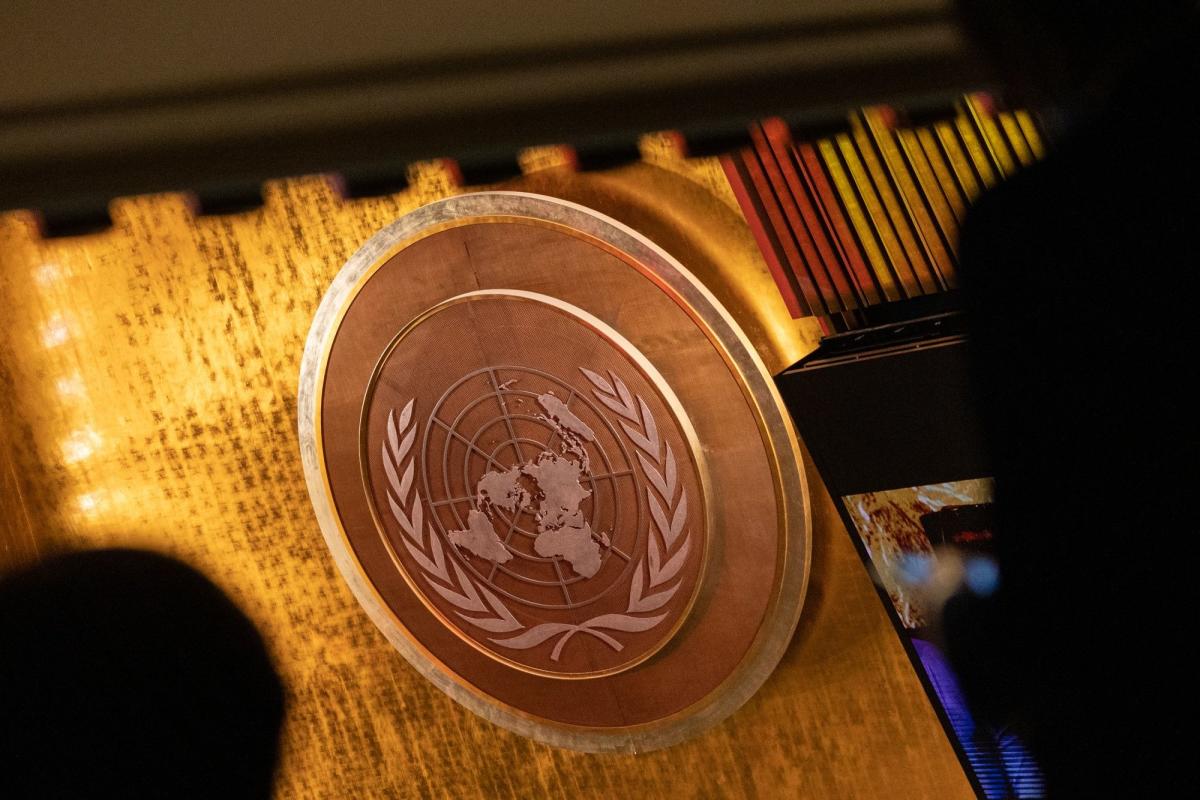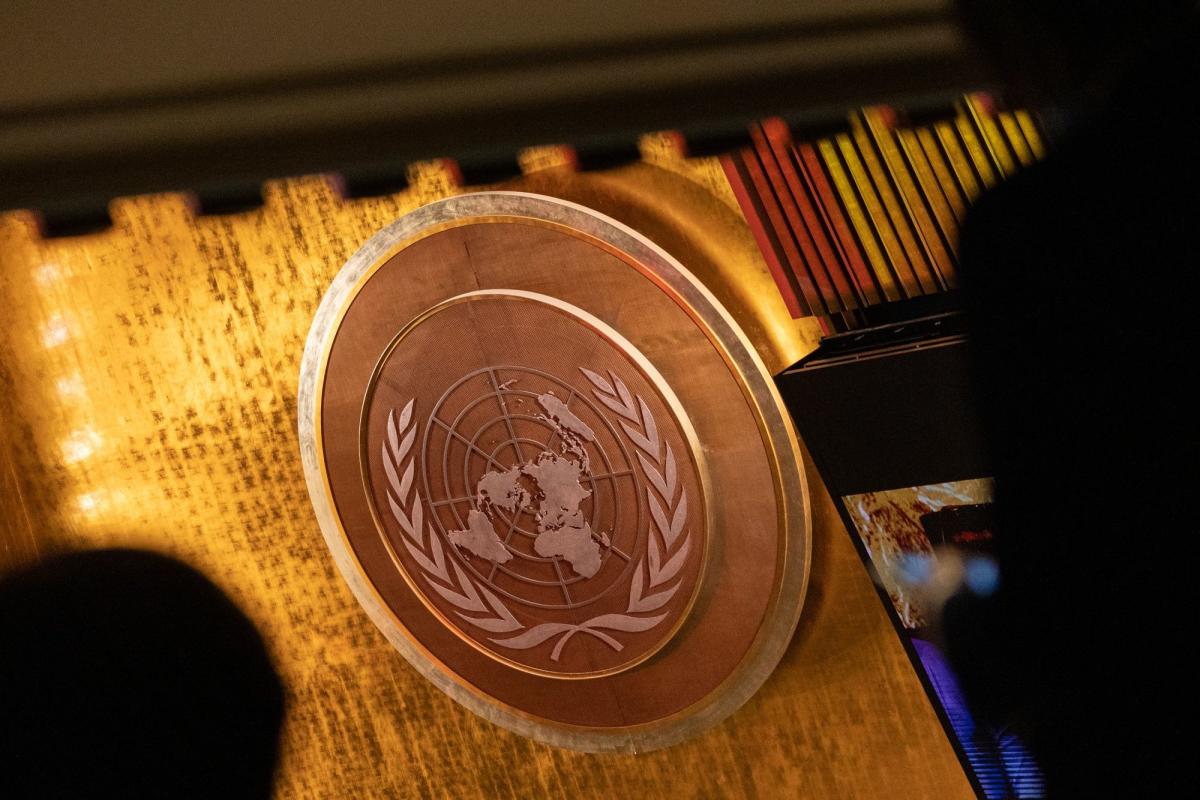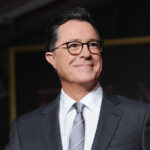
(Bloomberg) — Russia’s Foreign Minister Sergey Lavrov walked out of a UN Security Council meeting where the US and its allies were criticizing President Vladimir Putin’s government over the invasion of Ukraine, in a stark demonstration of the divisions opened up by the war.
Most Read from Bloomberg
Lavrov arrived at the meeting late, delivered his speech and left once it was done, refusing to stay for the speeches that accused Russia of committing war crimes and violating the UN Charter. He said the West forced Russia to launch it’s so-called “special military operation” to protect its own security.
Russia got some support from China in the meeting but otherwise little backing. UN Secretary General Antonio Guterres said the conflict has “supercharged a triple crisis of food, energy and finance.”
South Korean leader Yoon Suk Yeol was overheard insulting American lawmakers as “idiots,” after briefly meeting President Joe Biden to discuss issues including US electric-vehicle subsidies that South Korea wants to change.
Click here for the full schedule of speakers on Thursday.
(All times ET)
Essential reading:
-
EXCLUSIVE: Greece Is Ready for Potential Russian Gas Cutoff
-
How the UN Became a Bystander to the World’s Biggest Flashpoint
-
To catch up on the latest developments on Ukraine, click here.
-
And listen to our Twitter Space on UN’s struggle for relevance
-
Russia Is Left an Outlier Among World Leaders Gathered at the UN
-
North Korea Denies Selling Russia Arms, Blasts US for ‘Rumors’
Russia’s Lavrov Defends Invasion in Security Council Speech (12:45 p.m.)
Lavrov, Russia’s top representative at the General Assembly, defended his country’s invasion of Ukraine in a speech to a Security Council session on the crisis, before leaving the session midway through.
Lavrov reiterated the Kremlin’s assertion that what it calls a “special military operation” was “inevitable” because the US and its allies sought to use Ukraine as a “base for creating and realizing threats to Russian security.” Both Ukraine and the West have rejected those allegations.
Lavrov didn’t stay to listen to the other speeches at the session, nearly all of which blasted Russia’s invasion.
“He has left the chamber, I’m not surprised,” UK Foreign Secretary James Cleverly told the session shortly after Lavrov spoke. “I don’t think Mr. Lavrov wants to hear the collective condemnation of this council.”
Russia has also struggled to marshal support outside the Security Council. The General Assembly voted 101-7 with 19 abstentions to allow Ukrainian President Volodymyr Zelenskiy to speak by video link this week.
Guterres Denounces Russian Plans for Referendums (10:58 a.m.)
Secretary-General Guterres said he was “deeply concerned by reports of plans to organize so-called referenda in areas of Ukraine that are currently not under government control.”
“Any annexation of a state’s territory by another state resulting from the threat or use of force is a violation of the UN Charter and of international law,” Guterres told the Security Council in condemning Putin’s plans to stage sham referendums to justify claiming Ukrainian territory as part of Russia.
ICC Prosecutor Says World Must Show ‘Law Has Meaning’ (10:47 a.m.)
International Criminal Court Prosecutor Karim Khan said those guilty of war crimes or other abuses in Ukraine must be brought to justice, as diplomats used a Security Council session to again lament Russia’s invasion.
“This is a moment where we must collectively demonstrate — by action, not words — that the law has meaning,” Khan said. “Anybody who picks up a gun, anybody who fires a missile” must know the law applies and will be employed, Khan said.
Ireland’s Leader Cites ‘Shared Determination’ for Resolution With Truss (10:44 a.m.)
There’s a renewed sense of determination to resolve issues surrounding the Northern Irish Protocol as the UK’s Liz Truss begins work as prime mMinister, according to Ireland’s leader Micheal Martin.
Martin’s meeting at the weekend with Truss was “constructive” and “there is shared determination to get the issue resolved,” he said in an interview with Bloomberg Television.
While the difficulties in getting a resolution on the part of the Brexit agreement that deals with trade into Northern Ireland shouldn’t be underestimated, Martin said, he was “clear now that there is a will to get it resolved on all sides and where there is a will there’s always a means to doing that.”
US and Chinese Foreign Ministers to Meet on Friday (8:40 a.m.)
US Secretary of State Antony Blinken will meet with China’s Foreign Minister Wang Yi on Friday on the margins of the UN session, the State Department said in a statement.
The department said it’s “part of our ongoing efforts to maintain open lines of communication and manage competition responsibly.”
Amid tensions over issues from trade to the future of Taiwan, President Joe Biden told the UN gathering on Wednesday that “we do not seek a Cold War. We do not ask any nation to choose between the United States or any other partner.”
South Korean Leader Heard Insulting Congress (6:30 a.m.)
South Korean leader Yoon Suk Yeol was overheard insulting American lawmakers, after briefly meeting Biden to discuss issues including US electric-vehicle subsidies that South Korea wants to change.
“What an embarrassment for Biden, if these idiots refuse to grant it in Congress,” video broadcast on South Korean television showed Yoon telling Foreign Minster Park Jin in New York. The comments were caught on a microphone as Yoon and Park were leaving a brief chat with Biden at a Global Fund event.
Yoon has come under pressure at home to remedy provisions in the Inflation Reduction Act signed by Biden, which includes tax credits of as much as $7,500 for purchases of electric vehicles made in North America. That could disadvantage major South Korean brands like Hyundai and Kia, which don’t yet have operational EV plants in the US.
China and Russia Foreign Ministers Meet (11:15 p.m.)
China vouched for Russia’s role in the UN in a meeting between the two nations’ foreign ministers on the sidelines of the General Assembly, according to Tass. “Russia is a permanent member of the Security Council and must continue to play its important role in the UN. No one can deprive Russia of this right,” it quoted China’s Wang Yi as saying.
The meeting underscored the two countries’ similar approach to global affairs that allows them to “play a constructive role in the formation of a more just and sustainable polycentric world order,” Tass reported separately, citing a statement from the Russian Foreign Ministry. The two foreign ministers also criticized US foreign policy, particularly toward Taiwan.
Last week, Putin told Chinese leader Xi Jinping he understands Beijing’s “questions and concerns” about his invasion of Ukraine, a rare admission of tensions between the diplomatic allies that came in the first in-person talks between the leaders of the long-time partners since the war began.
Putin Acknowledges Xi’s ‘Concerns’ on Ukraine, Showing Tension
Truss Says Democracies ‘Must Deliver’ for Citizens (9:30 p.m.)
Truss evoked the struggle between democracy and autocracy as the UK prime minister paid tribute to the late Queen Elizabeth II, saying when the queen “addressed this general assembly 65 years ago, she warned that it was vital not only to have strong ideals but also to have the political will to deliver on them. Now we must show that will.”
The premier praised the international alliance that has supported Ukraine in the war against Russia and “at this crucial moment in the conflict, I pledge that we sustain or increase our military support to Ukraine for as long as it takes.”
US Sees General Assembly as Fertile Ground for Price Cap (8:20 p.m.)
US diplomats are using meetings on the sidelines of the General Assembly to push for other countries to adopt a price cap on Russian oil and petroleum products, a senior State Department official said.
The US is emphasizing that the price cap is meant to limit Putin’s ability to finance the Ukraine war. They also stress — particularly to developing countries — that the mechanism can keep cheap Russian oil on the market and stabilize global energy prices, the official said, adding countries have been receptive to the cap, especially those that haven’t previously discussed the subject with the US. Even nations that won’t agree to the cap understand they can benefit from discounts on Russian energy.
Zelenskiy Warns of Negotiations as Delaying Tactic (8 p.m.)
Zelenskiy, in his speech, asked for more weapons to pursue his country’s efforts to repel Russia’s invasion and warned that Moscow would try to use the prospect of negotiations as a delaying tactic. The Russians, he added, are “afraid of real negotiations.”
He spoke of a recent prisoner swap between Russia and Ukraine and praised the efforts of Saudi Arabia in brokering the deal.
Yoon, Kishida Sit Down Together in New York (7 p.m.)
The leaders of Japan and South Korea used their first summit in nearly three years to pledge to resolve historical issues that have damaged ties between the US allies.
Japan, South Korea Pledge Better Ties in First Summit Since 2019
South Korean President Yoon Suk Yeol and Japanese Prime Minister Fumio Kishida met for about 30 minutes in New York, where both had addressed a session of the assembly. Statements from both sides said the pair also discussed the importance of cooperation that includes the US as they face threats from the likes of North Korea.
Decisions by South Korean courts in recent years finding certain Japanese companies liable for compensation to Korean laborers for work done during Japan’s 1910-1945 colonial rule over the peninsula has soured ties. It also briefly touched off a trade dispute between the neighbors that the Biden administration has been courting as it seeks to secure supply lines for crucial goods such as semiconductors that diminish dependence on China.
Trump-Picked World Bank Boss Under Fire at UN (5 p.m.)
It’s one of the biggest talking points on the sidelines of the UN and among officials: why David Malpass insists on being a climate denier.
Pressure to replace the World Bank chief installed three years ago by former President Donald Trump has ramped up after his equivocations on the impact of burning fossil fuels sharpened criticism of the lender’s track record on climate change.
The controversy kicked off Tuesday when former US Vice President Al Gore labeled World Bank President David Malpass a climate denier and called for a change of leadership. Asked about the criticism during the same event in New York, Malpass dodged questions on the effects of man-made emissions on climate change before saying: “I don’t know. I’m not a scientist.”
Macron and Truss Appear to Put ‘Friend or Foe’ Question to Rest (4 p.m.)
French President Emmanuel Macron appeared to try to bury the hatchet with Truss on the sidelines of the assembly.
“There is a willingness to re-engage, to move forward and to show that we are, as it were, allies and friends in a complex world,” Macron told a group of reporters in New York City after the talks. “Now, I believe in evidence, and results.”
Macron’s government has repeatedly been at odds with former UK Prime Minister Boris Johnson’s, especially during post-Brexit negotiations and on issues related to migrants crossing the English Channel. When Truss was eying the position, she said “the jury’s out” on whether France was UK’s “friend or foe.”
The two leaders appeared to shake off tensions, smiling and shaking hands during a photo op preceding their meeting. Readouts of the conversation shared by their aides focused on their common stance on Ukraine and Russia rather than thornier issues including Northern Ireland.
Biden and Truss Present a United Front on Ukraine (2:31 p.m.)
Biden and Truss brushed shoulders at Queen Elizabeth II’s funeral but had to wait till now to formally sit down and get acquainted. At the Group of Seven summit in Germany, it was still Boris Johnson who was in power and the two men did not have a bilateral, a fact that the UK press was quick to pounce on.
Truss is a vocal hawk and the UK is the US’s closest geopolitical ally. On Ukraine the two countries are very much on the same page. Where there is tension is on the post-Brexit reality of a problematic Irish border.
The US president said he and Truss were both “committed to protecting” the Good Friday Agreement in Northern Ireland and that aiding Ukraine and countering China also were on the agenda.
The meeting was a chance for Biden and Truss to form a stronger personal bond and cool simmering tensions over trade and Northern Ireland. Truss has questioned the nature of the so-called “special relationship” between the US and UK. Asked Wednesday if the “special relationship” is intact, Truss gave a single, firm head nod.
Biden-Truss Era Dawns With Caution, Doubt, Silence on Trade
Biden Says US Doesn’t Seek Conflict With China (11:32 a.m.)
Biden told the General Assembly that the US doesn’t seek conflict with China and will conduct itself as “a reasonable leader.”
“We do not seek a Cold War We do not ask any nation to choose between the United States or any other partner,” Biden said in his speech. He also sought to tamp down speculation that his recent pledge to defend Taiwan if China invades marks a change in US policy.
“We seek to promote peace and stability across the Taiwan Strait, remain committed to our one China policy, which has helped prevent conflict for four decades,” Biden said. “We continue to oppose unilateral changes in the status quo by either side.”
Macron To Discuss Gas Prices, Supplies With Biden (11:30 a.m.)
Macron expects to improve coordination on energy and food with the US following a meeting with Biden this afternoon on the sidelines of the assembly. Europe needs to secure gas supplies and “reasonable pricing,” Macron said.
The French president called for “everyone to put maximum pressure on President Putin for him to end this senseless war.”
He declined to say how France would react if Russia were to use nuclear weapons. France’s doctrine is not to take part in any escalation, Macron said.
War in Ukraine Is Not Going Well For Putin, Greek Premier Says (11:26 a.m.)
Putin is going to try everything to turn the table as his invasion is not going well, Greek Prime Minister Kyriakos Mitsotakis said.
“We’re all united in supporting Ukraine defend itself against an open act of aggression,” Mitsotakis told Bloomberg TV in New York. “The war is not going well for Russia and I’m convinced Putin won’t succeed.”
Biden Says Putin’s War is About ‘Extinguishing Ukraine’s Right to Exist’ (11:12 a.m.)
Biden opened his speech to the General Assembly by condemning Putin’s push to escalate his military campaign in Ukraine, condemning it as a “brutal, needless war.”
Biden again sought to rally support from the rest of the world to stand up against Putin. The US president has marshaled a global campaign to aid Ukraine and counter Russia, authorizing billions of dollars of military assistance for Kyiv’s forces and imposing sanctions that have hobbled the Russian economy.
“This war is about extinguishing Ukraine’s right to exist as a state, plain and simple. And Ukraine’s right to exist as a people. Whoever you are, wherever you live, whatever you believe, that should make your blood run cold,” Biden said.
The US president has hailed the effort as proof he has been able to revitalize US alliances that were frayed by former President Donald Trump. Finland and Sweden, countries that for decades prized non-alignment, are on the brink of being welcomed into NATO amid concerns about Russian aggression. Existing allies have boosted defense spending, long a US goal.
Biden has also used bellicose language to condemn Putin for his invasion, calling him a war criminal and declaring in a major address in Warsaw earlier this year that “this man cannot remain in power.”
Iran Protests in New York (11 a.m.)
Hundreds of Iranians and others from across the US gathered at UN Plaza on Wednesday to protest Iranian President Ebrahim Raisi, following protests in his own country after the death in police custody of a 22-year-old woman accused of being inappropriately dressed.
In New York, attendees said they were there to fight for regime change. Chants, primarily in Farsi, called for the ousting of Raisi. Some called for the arrest of Raisi on US soil, denouncing that he was greeted upon arrival in New York with a US Secret Service detail.
Event speakers included former Kansas Governor Sam Brownback, former Connecticut Senator Joseph Lieberman, while many Iranian-Americans in attendance traveled from states across the US including California, Virginia, and Washington, D.C.
Why a Woman’s Death in Iran Has Ignited New Protests: QuickTake
Iran Accuses US and Holds up Photo of Soleimani (9:30 a.m.)
Raisi spoke from the podium as protests roil several cities in Iran following the death of a young woman who fell into a coma after being detained for flouting Islamic dress codes by the so-called “morality police.” State media reported six people were killed.
The Iranian president accused the US of trampling on the nuclear accord and called for “justice” for General Qassem Soleimani, the Iranian general who was killed in a drone strike ordered by former President Trump in 2020.
He held up a photo of Soleimani for the audience and admonished the US for “hypocrisy” and said the world “needs a strong Iran today.” He said his country would only agree to a nuclear deal that had tangible benefits for the country’s economy.
He made no mention of the protests that are currently embroiling his security forces — they have so far overshadowed his visit to New York and any efforts to break the latest deadlock in Tehran’s indirect talks with Washington to revive the 2015 nuclear deal. About 1000 Iranian-Americans are protesting his presence at the UN outside its headquarters.
It was his first in-person speech to the annual gathering and he’s the first hardline president to do so since Mahmoud Ahmadinejad, who once emptied the General Assembly hall after giving a diatribe against NATO, Israel and the West.
No contact is expected between Biden and Raisi at this gathering.
Nigeria Calls for More Debt Relief (9:50 a.m.)
Nigerian President Muhammadu Buhari called for more debt relief to be given to poorer nations.
A former army general, Buhari has served as president of Nigeria, which has Africa’s largest economy since 2015 and is due to step down next year after serving the maximum two terms. His tenure has been marred by spiraling state debt, rampant unemployment and widespread insecurity, with attacks being staged by Islamist group Boko Haram and other armed groups.
“The multifaceted challenges facing most developing countries have placed a debilitating choke-hold on their fiscal space,” he said at his last address to the General Assembly before leaving office next year. This situation requires “a global commitment to the expansion and extension of the debt-service suspension initiative to countries facing fiscal and liquidity challenges as well as outright cancellation for countries facing the most severe challenges,” he said.
Most Read from Bloomberg Businessweek
©2022 Bloomberg L.P.




